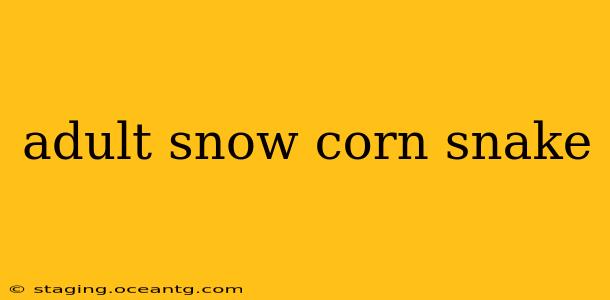The snow corn snake, a captivating albino morph of the corn snake ( Pantherophis guttatus), is a popular choice among reptile enthusiasts. Their striking white or cream coloration, often accompanied by faint red or pink markings, makes them visually stunning. Understanding the specific needs of an adult snow corn snake is crucial for ensuring its health and longevity. This guide delves into the care requirements, addressing common questions and concerns.
What size enclosure does an adult snow corn snake need?
Adult snow corn snakes require a spacious enclosure to thrive. A 40-gallon breeder tank is generally suitable for a single adult. Larger enclosures are always preferable, offering more space for exploration and enrichment. Remember to provide adequate ventilation to prevent the buildup of moisture and ammonia.
What is the best substrate for an adult snow corn snake?
Choosing the right substrate is vital for maintaining a clean and healthy environment. Aspen shavings, cypress mulch, or paper towels are excellent options. Avoid substrates like cedar or pine, as they contain oils that can be harmful to your snake. The substrate should be easily cleaned and replaced regularly to prevent bacterial growth and parasite infestations.
What temperature and humidity should I maintain for an adult snow corn snake?
Maintaining the correct temperature and humidity is paramount. A thermal gradient should be established within the enclosure, providing a basking area with a temperature of around 85-90°F (29-32°C) and a cooler end around 75-80°F (24-27°C). This allows the snake to thermoregulate effectively. The humidity should be kept at around 50-60%. A hygrometer is recommended to monitor humidity levels accurately.
What do adult snow corn snakes eat?
Adult snow corn snakes are carnivores and primarily feed on rodents. Frozen-thawed mice are the preferred food source, offering a convenient and safe feeding option. The size of the mouse should be roughly the same diameter as the widest part of the snake's body. Feeding frequency depends on the snake's size and age, but generally, adults are fed once or twice a week.
How often should I handle my adult snow corn snake?
While snow corn snakes are generally docile, it's important to handle them gently and respectfully. Frequent handling can help them become accustomed to human interaction, but excessive handling can stress them. Aim for a balance, handling your snake a few times a week for short periods. Always support their entire body to prevent injury.
How long do adult snow corn snakes live?
With proper care, adult snow corn snakes can live for 15-20 years, sometimes even longer. This longevity underscores the importance of providing a suitable environment and consistent care throughout their lives.
Are snow corn snakes good pets for beginners?
Snow corn snakes are often considered good beginner snakes due to their relatively docile temperament and ease of care. However, all reptiles require commitment and research. Understanding their specific needs before acquiring one is essential to ensuring their well-being.
What are the common health problems of adult snow corn snakes?
Like all reptiles, snow corn snakes can be susceptible to certain health problems. These include parasites, respiratory infections, and dysecdysis (shedding problems). Regular veterinary check-ups and attentive observation are crucial for early detection and treatment.
How can I tell if my adult snow corn snake is healthy?
A healthy snow corn snake will be alert, active, and have bright, clear eyes. Its skin will be smooth and shed regularly without difficulty. Its body should be firm and well-muscled, and its feces should be normal in consistency and color. Any deviation from these norms should be a cause for concern and warrant a visit to a reptile veterinarian.
This comprehensive guide offers a solid foundation for caring for an adult snow corn snake. Remember, responsible ownership involves continuous learning and adaptation to ensure your snake's long and healthy life. Always consult with a reptile veterinarian for any health concerns.
